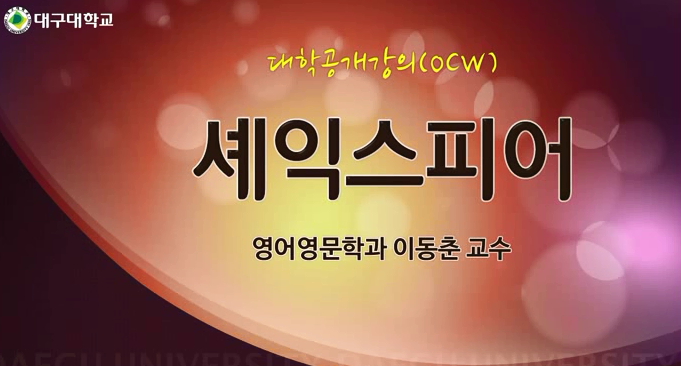Shakespeare was undoubtedly the most popular playwright of his time, and possibly of all time. His tragedies are well-known throughout the English-speaking world. One of his most famous works is Romeo and Juliet, a tragic love story. Romeo and Juliet ...
http://chineseinput.net/에서 pinyin(병음)방식으로 중국어를 변환할 수 있습니다.
변환된 중국어를 복사하여 사용하시면 됩니다.
- 中文 을 입력하시려면 zhongwen을 입력하시고 space를누르시면됩니다.
- 北京 을 입력하시려면 beijing을 입력하시고 space를 누르시면 됩니다.
https://www.riss.kr/link?id=T14360986
- 저자
-
발행사항
춘천 : 강원대학교, 2017
- 학위논문사항
-
발행연도
2017
-
작성언어
한국어
- 주제어
-
KDC
800.09 판사항(6)
-
발행국(도시)
강원특별자치도
-
기타서명
A Comparative Study on Romeo and Juliet and Liang Shanbo’s Biography
-
형태사항
iv, 49 L. : 삽도 ; 26 cm
-
일반주기명
강원대학교 논문은 저작권에 의해 보호받습니다.
지도교수:한광석
참고문헌 : L. 45-47 - 소장기관
-
0
상세조회 -
0
다운로드
부가정보
다국어 초록 (Multilingual Abstract)

Liang Shanbo's biography presents us with another type of tragedy; its origin lies in the East. In the biography, Zhu Yingtai disguised herself as a man in order to pursue an educational path. While on this path, she bumped into Liang Shanbo again and became his bosom friend. However, her father forced her to accept a marriage proposal from another man, which sharpened the conflict between love and feudal ethics.
Each love is built on traditional culture and social institutions. The purpose of my study is to use Romeo and Juliet and Liang Shanbo's biography to analyze the difference in ideals about, and the portrayal of, love in works of love from the East and West. What they share in common is a willingness to sacrifice themselves for their love. They both view death as the ultimate way to assert the dignity of love, which can resolve conflicts between the individual and society.
Juliet is frank and bold; she is brave enough to pursue her true love. In contrast, Zhu Yingtai's ideas are clearly influenced by traditional Confucianism, which, in Eastern thought, is viewed as more important than one's personal desires or beliefs. People from the East regard selfless contributions as the highest standard of morality. Zhu can not make a drastic decision because of familial pressures and traditional filial piety. She is constrained by patriarchal clan rules and the rigid stratification of feudal ethics, but through death, she chooses her love and gets rid of the shackles of the patriarchal clan rules and feudal ethics.
By comparing these two different stories, my study draws a conclusion that highlights the similarities and differences between Eastern and Western concepts of love. Although the two stories took place in two different cultures, they share similar values.
Shakespeare was undoubtedly the most popular playwright of his time, and possibly of all time. His tragedies are well-known throughout the English-speaking world. One of his most famous works is Romeo and Juliet, a tragic love story. Romeo and Juliet are two youths who fall in love with each other despite a feud between their families. Their families oppose their relationship, and they decide to end their lives because of the destructive nature of their family's conflict.
Liang Shanbo's biography presents us with another type of tragedy; its origin lies in the East. In the biography, Zhu Yingtai disguised herself as a man in order to pursue an educational path. While on this path, she bumped into Liang Shanbo again and became his bosom friend. However, her father forced her to accept a marriage proposal from another man, which sharpened the conflict between love and feudal ethics.
Each love is built on traditional culture and social institutions. The purpose of my study is to use Romeo and Juliet and Liang Shanbo's biography to analyze the difference in ideals about, and the portrayal of, love in works of love from the East and West. What they share in common is a willingness to sacrifice themselves for their love. They both view death as the ultimate way to assert the dignity of love, which can resolve conflicts between the individual and society.
Juliet is frank and bold; she is brave enough to pursue her true love. In contrast, Zhu Yingtai's ideas are clearly influenced by traditional Confucianism, which, in Eastern thought, is viewed as more important than one's personal desires or beliefs. People from the East regard selfless contributions as the highest standard of morality. Zhu can not make a drastic decision because of familial pressures and traditional filial piety. She is constrained by patriarchal clan rules and the rigid stratification of feudal ethics, but through death, she chooses her love and gets rid of the shackles of the patriarchal clan rules and feudal ethics.
By comparing these two different stories, my study draws a conclusion that highlights the similarities and differences between Eastern and Western concepts of love. Although the two stories took place in two different cultures, they share similar values.
목차 (Table of Contents)
- 목 차
- I. 서 론 .................................................................................................... 1
- 목 차
- I. 서 론 .................................................................................................... 1
- Ⅱ. 본 론
- 1) 줄리엣의 영웅적인 사랑 ........................................................................ 5
- 2) 추양대의 탈 전통적인 사랑 .................................................................. 16
- 3) 줄리엣과 추양대의 사랑관 비교 ............................................................ 29
- Ⅲ. 결 론 .................................................................................................. 42
- Ⅳ. 참고문헌 ............................................................................................. 45
- Ⅴ. Abstract ............................................................................................. 48









